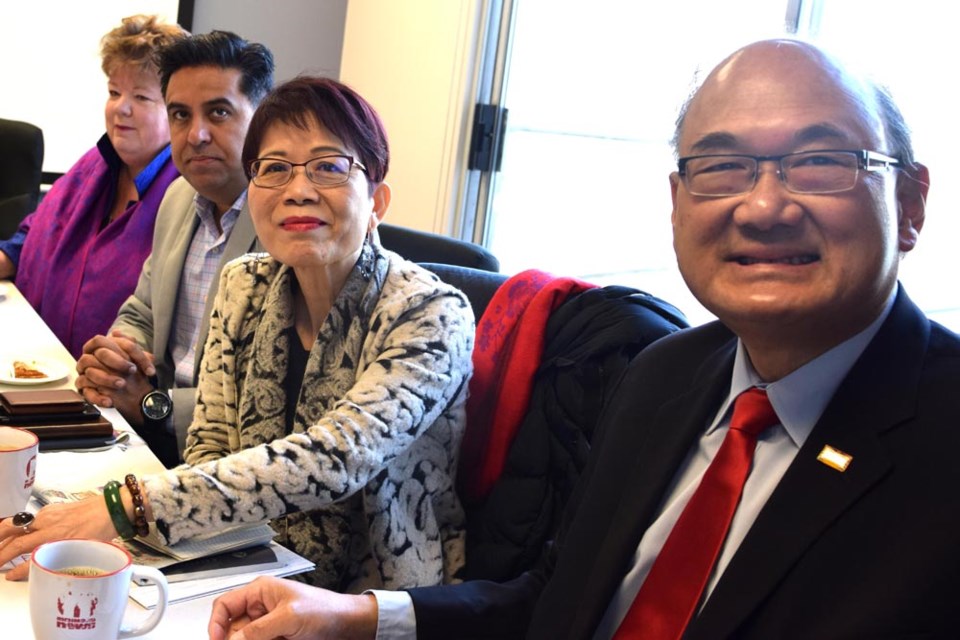Richmond’s four Liberal MLAs say they are concerned about a potential economic slowdown in B.C. due to what they describe as NDP government taxes on the housing market and small businesses.
Just before Christmas, MLAs Teresa Wat (Richmond Centre), Jas Johal (Richmond-Queensborough), John Yap (Richmond-Steveston) and Linda Reid (Liberal-Richmond East) had a sit-down interview with the Richmond News to review the past year and to share their visions for 2019.
“We have the largest opposition caucus in history in this province, so we have formed a very effective opposition and have been very effective in pointing out some challenges the B.C. government has had,” said Johal.
He said there are a “significant amount of challenges moving forward for Richmond residents, such as the $5.5 billion new tax increases” in the NDP’s 2018 budget, which include the new employer health tax, carbon tax, the new speculation tax, the foreign buyer tax increase and the new cannabis tax.
The NDP argue that these taxes will “ease the burden on B.C. families.” For example, the employer health was introduced to offset the fact the government cut MSP premiums for individuals by half last January.
However, Johal said the new employer health tax, which was put in effect on Jan. 1, has shifted the burden to employers and might result in higher property taxes for residents.
B.C. Businesses with an annual payroll of more than $500,000 need to pay 0.98 to 1.95 per cent of the payroll as an employer health tax.
“It will hit the private and public sectors — the school board and the city hall have to pay it as well, so it’s the Richmond taxpayers that have to pay for the cost eventually, ” said Johal.
Wat added that the tax will also discourage businesses from expanding and hiring workers in B.C.
Reid agreed, saying, “it’s about jobs at the end of the day. It’s about creating more people with employment because taxes will fall on the same people, and when the tax burden grows, the province slows down.”
When asked what they think of the current challenge that people who have jobs still cannot afford to own a home, Johal said “affordable housing is a challenge for all political parties,” but they don’t believe the speculation tax introduced by the NDP government is the solution.
In February 2018, the NDP government took steps to reduce speculation in B.C.’s real estate market by imposing a new speculation tax and increasing the foreign buyers tax to 20 per cent.
Both measures were intended to slow the influx of foreign money that many argue is driving up B.C. home prices.
However, Johal believes the speculation tax targets local property owners and people working in the real estate industry.
“The speculation tax will have a cumulative effect on investment in the province,” he said.
“I think the development industry feels like they are being picked on. In the long term, there’s going to be some challenges getting projects built.
This was echoed by Yap: “A lot of projects now are at risk because of taxes imposed on builders. This is a real concern.”
The MLAs also expressed their disappointment around the NDP government’s lack of action on the George Massey Tunnel replacement project and its proposed regulations on ride sharing, which they believe is too strict and thus “defeats the purpose of ride-sharing.”
Regarding the tunnel, the province announced last month it would consult with municipalities and First Nations, and present a business case on three possible solutions to the tunnel in 2020.
It blamed the previous Liberal government for not consulting with local communities or “fully considering feasible alternatives or local opinions on the best path forward.”
All regional mayors, save one, opposed the Liberal’s earlier plan to build mega bridge.
The NDP government introduced long-awaited ride-sharing legislation in November, which, if passed, will require all drivers to have a Class 4 passenger licence instead of the standard Class 5 licence that most B.C. drivers have.
Richmond MLAs argue that this requirement just add more unnecessary red tape.
All four MLAs said they’re looking forward to the new year and holding the current government to account.



